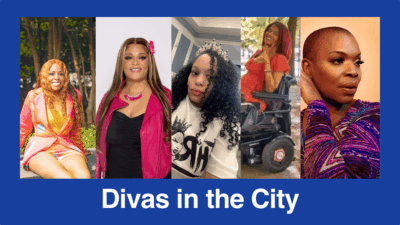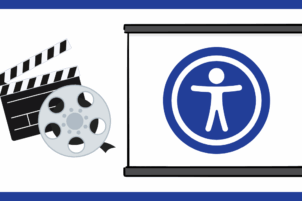 The new unscripted digital series Divas in the City follows five disabled Black women whose tenacity and creativity make them bosses in their respective cities. Professional and playful, serious and sassy, these women with physical disabilities are trendsetters in fields ranging from fashion to the arts to the nonprofit sector.
The new unscripted digital series Divas in the City follows five disabled Black women whose tenacity and creativity make them bosses in their respective cities. Professional and playful, serious and sassy, these women with physical disabilities are trendsetters in fields ranging from fashion to the arts to the nonprofit sector.
The series is the brainchild of the show’s executive producer, Dr. Donna Walton, founder/president of The Divas With Disabilities Project (DWD), a nonprofit that provides women and girls of color with physical disabilities with unique opportunities to shape how disability is portrayed in mass media.
“I was moved to create Divas in the City because representation matters—especially for Black women with disabilities,” Walton told Disability Belongs™. “Too often, our stories are left out of mainstream media, and when we do appear, it’s rarely in a way that reflects the full depth and richness of our lives. I wanted to change that.”
Walton, who has a limb difference, teamed up with co-executive producer Tameka Citchen-Spruce, an independent film producer, and alumna of the 2021 Disability Belongs™ Entertainment Lab. A wheelchair user following a spinal cord injury in her youth, Citchen-Spruce knows the impact of representation.
“Growing up as a Black woman, a young woman with a disability, I never [saw] representation of my community on screen,” she said. “So, I was like, ‘Okay, this would be awesome to be able to tell different women’s stories. They’ll give people the behind-the- scenes of what our life is like.’”
In each vlog-style video, the Divas invite the audience into their world—filled with work, family, and a sense of purpose. “To be a boss,” Citchen-Spruce said, “is taking charge of your life…having that type of agency over your life and what you do.”
“This series is about more than visibility—it’s about power,” Walton added. “It’s about shifting perceptions and ensuring that the world sees Black women with disabilities as bosses in their own right—running businesses, breaking barriers, and leading with confidence.”
With an unapologetic enthusiasm for life, the five cast members reject the negative stereotypes too often associated with disabled women of color. As their show quote declares: “Divas never dim their light. We ask others to wear shades if our wattage is too high!”
“At its core, this series is a declaration that we belong front and center in the conversations that shape culture,” Walton said. “It’s about filling the space with stories about us that have long been missing, and ensuring that future generations won’t have to wonder where they fit.”
Not only are the Divas sharing their stories but, in true boss fashion, they are helping to capture them. “I worked with each cast member on what story they want to tell [and] how to record themselves,” said Citchen-Spruce. Using microphones, tripods, and other equipment provided by the production team, the Divas filmed themselves in their own environments. Their footage was masterfully edited by Robert C. Wertman, and funded by a grant from the Center for Cultural Innovation, which supports spinal cord injury survivors pursuing artistic projects.
The creative team reflects the values of the show. Executive Producer Cheryl Bedford is founder of Women of Color Unite (WOCU), a nonprofit organization committed to supporting more than 6,000 women of color who work in media. “WOCU has been instrumental in connecting us with the right networks,” Walton noted. “Cheryl’s leadership helped shape the strategic direction of the series.”
Meet the Divas
- Zazel-Chavah O’Garra (New York): Founder and artistic director of a physically integrated dance company. She began this path after surviving a benign brain tumor that cause partial paralysis and cognitive loss.
- Melva Henderson (Texas): Playwright, speaker, and nonprofit founder whose commitment to supporting people with visual impairments stems from her personal experience with optic atrophy.
- Natalia Mendez (Dominican Republic): Founder of Women on Wheels, a nonprofit that educates and empowers women with spinal cord injuries.
- Karen Gasperini -Quiles (Rhode Island): Children’s book author, model, and speaker, living with Beals Syndrome, who uses her social media platform to promote positive representation of disabled people of color.
- Kebra Moore (Texas): Entrepreneur, three-time published author, wheelchair user, and crab leg lover.
Together, the Divas show what it means to live boldly after acquiring a disability. As Walton put it, “They are leaders, innovators, and disruptors, each carving out space in their respective fields…Their confidence is not just about personal success; it’s about creating pathways for others, ensuring that visibility and representation extend beyond themselves.”
Only one Diva was born with a disability, Citchen-Spruce shared, and the show acknowledges the grief that can accompany acquiring a disability. Yet Divas in the City shows that disability doesn’t end your story—it simply starts a new chapter.
Divas in the City premieres on May 5th on Instagram (@divasinthecity.tv), Facebook, TikTok, YouTube, and LinkedIn.
Disability Belongs™ spoke with Donna R. Walton to learn more about what inspired Divas in the City and the powerful vision behind it.
Disability Belongs: What moved you to want to create this series?
Donna Walton: I was moved to create Divas in the City because representation matters—especially for Black women with disabilities. Too often, our stories are left out of mainstream media, and when we do appear, it’s rarely in a way that reflects the full depth and richness of our lives. I wanted to change that.
As a Black woman with a disability myself, I know firsthand how important it is to see ourselves in the media we consume—not as side characters or stereotypes, but as fully realized individuals with ambition, talent, and complexity. Black women with disabilities live at the intersection of race, gender, and disability, and yet, we are often erased from conversations about diversity and inclusion. If Black women already have limited television choices, then those of us with disabilities have almost none.
That’s why it felt natural to create a series like Divas in the City. My organization, the Divas with Disabilities Project, is rooted in the idea of amplifying representation and ensuring that Black women with disabilities are seen, heard, and celebrated. With so many brilliant, talented women leading and creating in their own ways, it only made sense to craft a series that would bring their stories to a wider audience.
Alongside Tameka Citchen- Spruce, I helped bring Divas in the City to life as a digital series and movement—one that challenges outdated perceptions and reshapes the narrative about what disability looks like in media. This project is about ownership of our stories, about ensuring that Black women with disabilities are at the center of our own narratives, not sidelined or overlooked.
At its core, this series is a declaration that we belong front and center in the conversations that shape culture. It’s about filling the space with stories about us that have long been missing, and ensuring that future generations won’t have to wonder where they fit. We are here. We have always been here. And now, all eyes are going to be on us.
DB: Why did you decide to release this as a digital series?
DW: In the beginning, our vision for Divas in the City was ambitious—we imagined it as a full-scale television production, possibly even a reality TV show that would give Black women with disabilities the visibility they deserve. We knew the impact such a show could have in shifting narratives and reshaping media representation, but we also understood the challenges that come with breaking into traditional television.
Getting the right contacts, securing a network-ready audience, and navigating the industry roadblocks all presented hurdles that made us rethink the best approach. Instead of waiting for mainstream media to catch up, we chose to lead the way. Moving forward with a digital series allowed us to tell these important stories on our terms, in a way that felt authentic and accessible.
With Divas in the City as a digital series, we can share shorter, powerful clips that highlight the incredible stories of Black women with disabilities while simultaneously building an engaged audience. This format gives us the flexibility to shape our own narrative, connect directly with viewers, and create momentum without the constraints of traditional TV networks. More importantly, it allows us to organically grow interest and visibility—so when the time comes, we will have already laid the groundwork for bigger opportunities, including potential network partnerships.
Ultimately, the shift to digital was about strategy and empowerment. It ensures that Divas in the City reaches its audience now, rather than waiting for the industry to give us permission. This series is just the beginning of what we know will be a lasting movement, one that ensures Black women with disabilities take their rightful place front and center in the media landscape.
DB: The casting call specified that the series would feature African American women who are “bosses” in their cities. What does it mean to be a “boss” and why was that your target?
DW: To be a boss means having agency over your life—knowing who you are, owning your talents, and embracing the fullness of your identity, including your disability, as a detail rather than a limitation. It’s about carving out your own path, whether through entrepreneurship, leadership, or simply excelling in multiple spaces at once. A boss is someone who doesn’t wait for permission to take up space—they claim it.
For Divas in the City, we wanted to showcase African American women with disabilities who embody this spirit of self-determination. These women are multi-dimensional, balancing careers, passions, and responsibilities while proving that their disability does not define their capabilities. Whether they have a day job and a side hustle, are business owners, artists, advocates, or innovators, each of them is showing the world that success comes in many forms—and that they are enough exactly as they are.
Our target was intentional. African American women with disabilities are often overlooked when it comes to mainstream representations of success and leadership. We wanted to change that. By featuring these women, Divas in the City is not just amplifying their stories—it’s challenging outdated narratives and proving that leadership, ambition, and excellence exist in spaces where people rarely think to look.
This series is about more than visibility—it’s about power. It’s about shifting perceptions and ensuring that the world sees Black women with disabilities as bosses in their own right—running businesses, breaking barriers, and leading with confidence. They are defining success on their own terms, and Divas in the City is here to make sure their stories are seen, celebrated, and respected.
DB: What has it been like working with the Divas? What attributes have you noticed that they have in common? How do they differ?
DW: Working with the Divas has been an inspiring, dynamic, and deeply affirming experience. Each woman brings her own unique energy, perspective, and lived experience to the series, making Divas in the City a rich tapestry of voices that challenge stereotypes and redefine what it means to be a Black woman with a disability.
What they have in common is unapologetic self-ownership—every Diva embraces her identity fully, refusing to shrink herself to fit into society’s narrow expectations. They are leaders, innovators, and disruptors, each carving out space in their respective fields, whether in business, advocacy, media, or the arts. Their confidence is not just about personal success; it’s about creating pathways for others, ensuring that visibility and representation extend beyond themselves.
At the same time, their differences are what make the series so compelling. Each Diva has a distinct approach to navigating life—some are bold and outspoken, while others lead with quiet resilience. Their journeys vary: some have built businesses from the ground up, others are breaking barriers in corporate spaces, and some are using their platforms to shift cultural narratives. Their disabilities also shape their experiences in different ways, influencing how they move through the world and the challenges they face. But despite these differences, they all share a commitment to authenticity—to showing up as their full selves, without compromise.
Ultimately, working with the Divas has reinforced the power of community and representation. This series is not just about individual success stories—it’s about collective impact, about showing the world that Black women with disabilities are here, thriving, and leading in ways that demand attention and respect.
DB: What is unique about working with disabled talent?
DW: What’s unique about working with disabled talent isn’t just the representation—it’s the deep, personal understanding that comes with shared lived experiences. I have spent my life within spaces where disability is part of the fabric, where resilience isn’t just a word but a necessity, and where adaptation and advocacy go hand in hand. That familiarity shifts everything—it removes the distance, allowing me to create from a place of true connection rather than assumption.
When you work with disabled talent, you aren’t just casting a role or shaping a story—you’re honoring experiences that have long been overlooked. There’s a knowingness—a cultural understanding that makes the process feel familial, grounded in respect and authenticity. You don’t have to explain the extra steps, the barriers, or the ways the world wasn’t built with us in mind. You just know, because you’ve seen it, lived in it, and understand how it shapes people’s realities.
Beyond that, disabled talent brings a level of innovation and depth that the industry often underestimates. There’s a boldness in how they approach storytelling, shaped by years of navigating spaces that weren’t designed for them. They think beyond convention—not because they have to, but because it’s second nature. That’s what makes working with them so powerful—they redefine what’s possible, not just for themselves, but for everyone who comes after them.
And yet, even within the shared experiences, there’s so much diversity—in perspectives, in creativity, in the ways each person chooses to shape their narrative. That’s what makes this work dynamic. It’s about amplifying voices, honoring differences, and ensuring that disabled talent is seen for the full spectrum of who they are—not just through the lens of their disability, but through their power, their artistry, and their undeniable presence.
DB: Tell me about the organizations that partnered with you to make this project happen.
DW: Divas in the City has been shaped not just by the incredible talent involved but also by the powerful partnerships that have helped bring the vision to life. One of the most significant collaborations has been with Women of Color Unite (WOCU), led by the brilliant Cheryl Bedford. Cheryl’s expertise in the industry, combined with her commitment to fair access, fair treatment, and fair pay for women of color in entertainment, made her the perfect executive producer for this project.
WOCU has been instrumental in connecting us with the right networks, ensuring that Divas in the City isn’t just another project—it’s a movement with real industry backing. Cheryl’s leadership and deep understanding of producing, funding, and distribution have helped shape the strategic direction of the series, making sure it reaches the audiences it deserves.
Beyond WOCU, the collaboration with Tameka Citchen-Spruce has been a perfect creative fit. She brings the technical expertise to translate vision into reality, ensuring that the storytelling is not just compelling but visually impactful. Her flexibility, open-mindedness, and ability to balance big ideas make her an ideal collaborator—someone who can temper enthusiasm while still pushing creative boundaries.
These partnerships have ensured that Divas in the City is not just a series, but a statement—one that amplifies the voices of Black women with disabilities and challenges the industry to rethink representation.
DB: What can viewers expect to see and experience in this series?
DW: Viewers can expect Divas in the City to be real, raw, and unapologetically authentic. This isn’t a scripted drama or an inspirational highlight reel—it’s a reality-based digital series that gives an unfiltered look into the lives of Black women with disabilities.
The series challenges stereotypes and sparks conversations by showcasing the personal journeys, challenges, and triumphs of its cast members. Each Diva brings a distinct voice to discussions about identity, family, business, independence, and leadership, offering perspectives that are rarely seen in mainstream media.
Expect to see powerful storytelling, moments of joy, resilience, and real-life experiences that push for true inclusion. The series is designed to amplify representation, ensuring that Black women with disabilities are seen as they truly are—leaders, innovators, and forces to be reckoned with.
It’s not just about visibility—it’s about changing the narrative. Viewers will walk away with a deeper understanding of what it means to navigate the world as a Black woman with a disability—and to do it with power and purpose.
DB: What do you hope viewers will take away from watching this series?
DW: I hope viewers walk away from Divas in the City with a new perspective, a deeper understanding, and a lasting sense of empowerment. This series isn’t just about visibility—it’s about changing the way people see Black women with disabilities.
I want audiences to recognize that disability is not a limitation—it’s just a detail in a much larger, richer story. The women featured in this series are leaders, innovators, and creators, shaping their own narratives and refusing to be defined by societal expectations. Their journeys are filled with resilience, ambition, and joy, and I hope viewers see that success, power, and influence come in many forms.
Beyond that, I want people—especially Black women with disabilities—to feel seen, validated, and inspired. I want them to know that their stories matter, that their experiences deserve to be told, and that they are more than enough exactly as they are.
And for those who may not have thought deeply about disability before, I hope this series challenges assumptions and sparks conversations. I want it to push people to rethink representation, to demand more inclusive storytelling, and to recognize that true diversity means embracing all identities, all experiences, and all voices.
Ultimately, Divas in the City is about power, presence, and possibility—and I hope every viewer walks away knowing that Black women with disabilities are here, thriving, and leading in ways that demand attention and respect.







